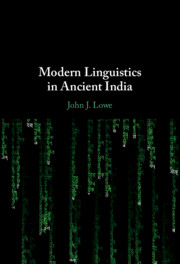Book contents
- Frontmatter
- Contents
- Acknowledgements
- Glossary
- List of Abbreviations
- Texts and Authors
- The Sanskrit Transcription System
- 1 Introduction
- 2 The Aṣṭādhyāyī at Work
- 3 Rule Interaction
- 4 Morphological Systems
- 5 Syntax: Argument Structure
- 6 Formal Language Theory and Computational Power
- 7 Semantics and Pragmatics: Compositionality and the Relation between Grammar and Meaning
- 8 Phonology: Phonemes and Writing Systems
- 9 Conclusion
- References
- Subject Index
- Author Index
- Index Locorum
- Word Index
8 - Phonology: Phonemes and Writing Systems
Published online by Cambridge University Press: 14 March 2024
- Frontmatter
- Contents
- Acknowledgements
- Glossary
- List of Abbreviations
- Texts and Authors
- The Sanskrit Transcription System
- 1 Introduction
- 2 The Aṣṭādhyāyī at Work
- 3 Rule Interaction
- 4 Morphological Systems
- 5 Syntax: Argument Structure
- 6 Formal Language Theory and Computational Power
- 7 Semantics and Pragmatics: Compositionality and the Relation between Grammar and Meaning
- 8 Phonology: Phonemes and Writing Systems
- 9 Conclusion
- References
- Subject Index
- Author Index
- Index Locorum
- Word Index
Summary
Chapter 8 moves to the third strand of the Indian linguistic tradition (alongside ‘grammar’ and semantics): phonetic and phonological analysis. This strand of the Indian tradition has particular relevance to the modern Western concept of the ‘phoneme’, which has played a central yet controversial role in phonological analysis over the last century. Several criticisms of the phoneme concept have attributed its popularity in modern linguistics to the centrality of alphabetic writing in Western society, and some have pointed to India as a contrasting situation, where writing was never alphabetic. I show that in contrast to what is often assumed, the ancient Indian tradition of phonetic and phonological analysis depended on a concept essentially equivalent to the modern concept of a phoneme, despite not being influenced by an alphabetic (or indeed, originally by any) writing system.
- Type
- Chapter
- Information
- Modern Linguistics in Ancient India , pp. 188 - 212Publisher: Cambridge University PressPrint publication year: 2024

